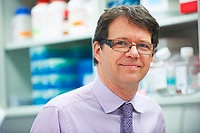 |
| Memorial Sloan-Kettering's Michel Sadelain |
The FDA has lifted a clinical hold placed on a study at Memorial Sloan-Kettering of Juno Therapeutics' cutting-edge approach to treating cancer using genetically tailored T cells.
"I confirm that the FDA has rapidly lifted the hold, as expected," wrote MSK's Michel Sadelain in an email to FierceBiotech on Saturday. Sadelain's breakthrough research on chimeric antigen receptors (CAR) forms the foundation for much of the work now being done on CAR-Ts.
Just two weeks ago Sadelain--one of the scientific founders of Juno Therapeutics, which has set out to commercialize the work with $145 million in backing from an investment group that includes Amazon's Jeff Bezos--startled investors and experts in the field when he told a group at a meeting of the American Association for Cancer Research that the deaths of two patients in a study of aggressive non-Hodgkin lymphoma had forced a halt to enrolling new patients. Both patients apparently died after the therapy triggered an intense reaction called cytokine release syndrome. The company, which was told of the FDA's decision on March 26, had noted the abrupt stop a few days before the AACR meeting on clinicaltrials.gov but had not put out word about the regulatory action.
Juno, which was founded on research from MSK and the Fred Hutchinson Cancer Research Center in Seattle, has attracted global attention for its work on CAR treatments, which involves some genetic tinkering to get T cells to attack cancer cells. Novartis ($NVS), which in-licensed a competing program from the University of Pennsylvania's Carl June, is widely considered the leader in this field. And both groups are battling it out in court over who has the right to develop the potential blockbuster technology.
In MSK's study, one of many now in the clinic, the T cells were engineered to recognize the CD19 protein on the surface of cancer cells. And it's been an extremely effective technology. As investigators noted, a remarkable 88% of the patients in the study had a complete response to the CAR therapy.
Two of the patients, though, died under circumstances that triggered an alarm with regulators. One had heart disease and another died of seizures. In a follow-up story, Forbes' Matthew Herper explained in some detail how the therapy spurs cytokine release syndrome as the immune cells multiply to combat the cancer.
In severe cases, it's known as a cytokine storm, where the cytokines released by activated T cells create a sudden inflammatory response in the system that spurs a noninfectious fever.
"The consensus is that (cytokine release syndrome) is a good thing," notes Mark Frohlich, the head of R&D of Juno, who will later direct the pivotal study for the drug once it advances past mid-stage trials. It shows that the T cells are proliferating and being activated to counter the disease. But in a subset of patients the reaction is so severe, fever sets in, blood pressure drops and there are occasionally signs of neurological changes. And the severest responses can be correlated to higher tumor burdens, which trigger greater levels of T cell activation, adds Frohlich, the former CMO at Dendreon.
The two deaths in the Memorial Sloan-Kettering study spurred a review of the patient profile investigators used for recruitment. Patients with heart disease and other comorbidities could be particularly vulnerable to the toxicity threat and will have to be winnowed out. In other cases, Frohlich tells FierceBiotech, the dose of the treatment can be lowered if physicians track a higher disease burden. An interleukin-6 antibody could also counter the threat, along with a high dose of steroids--though that would be considered a last-ditch effort.
Cytokine release syndrome is the main toxicity threat to emerge from this treatment method, says Frohlich, but it looks like a manageable risk considering the potential rewards for patients.